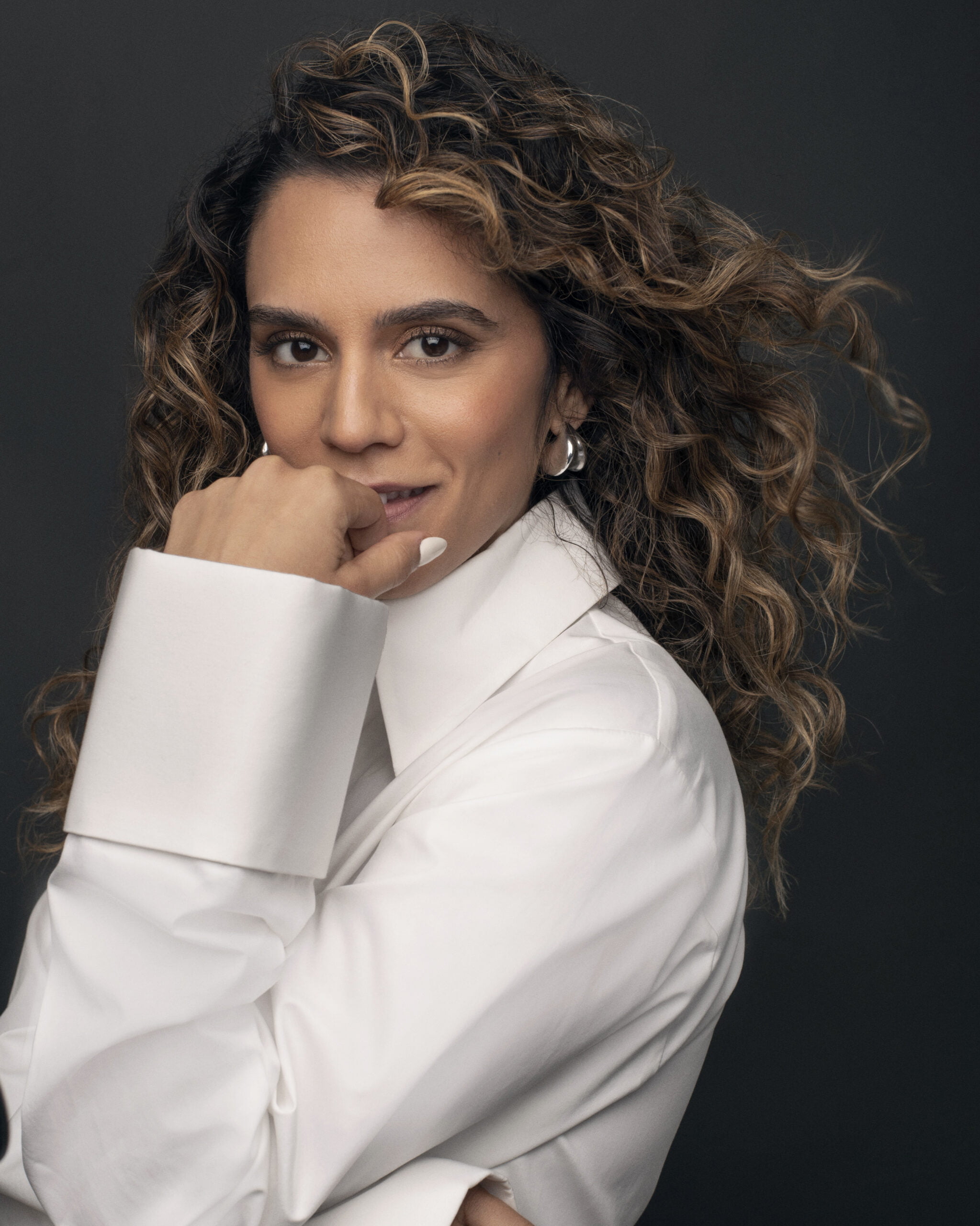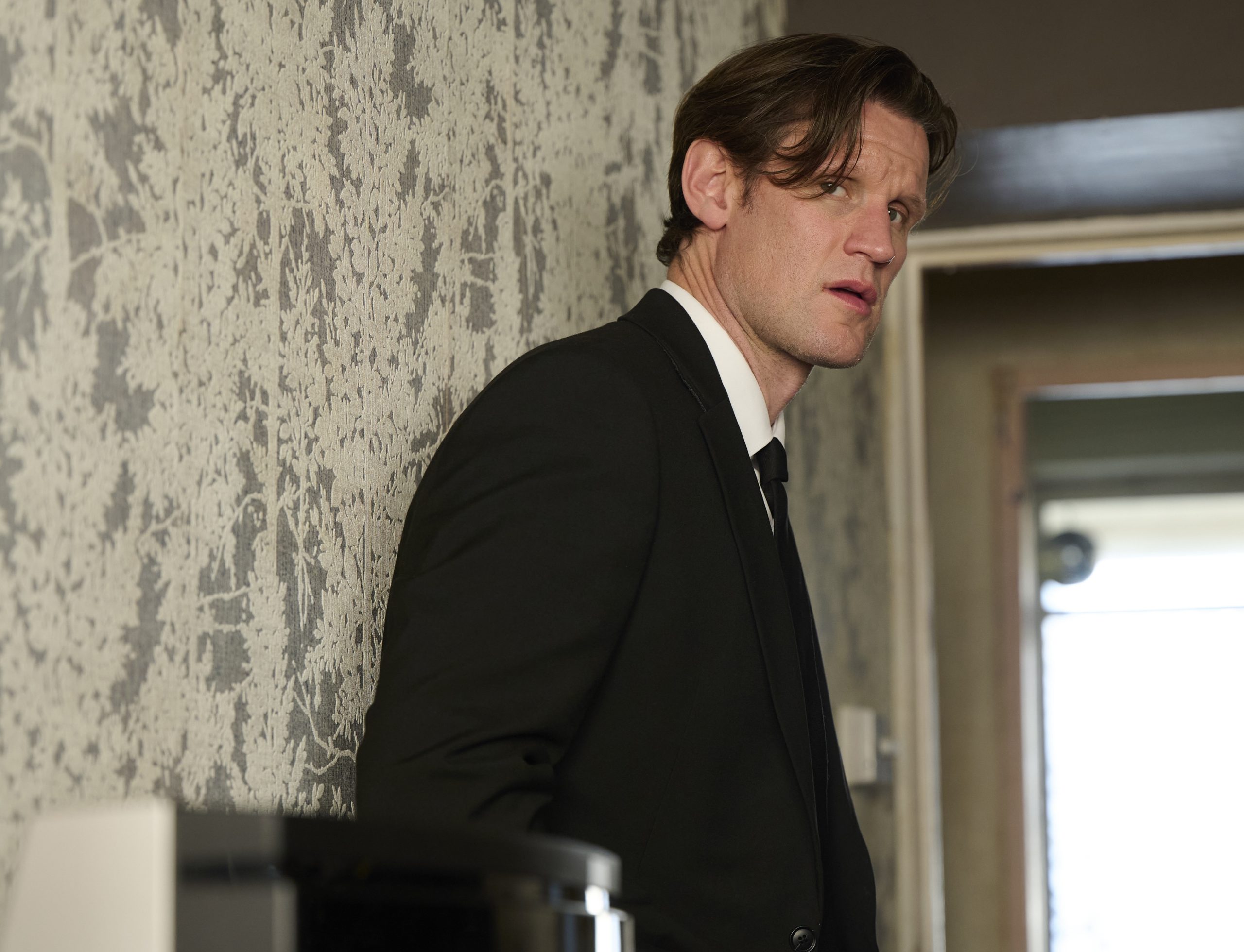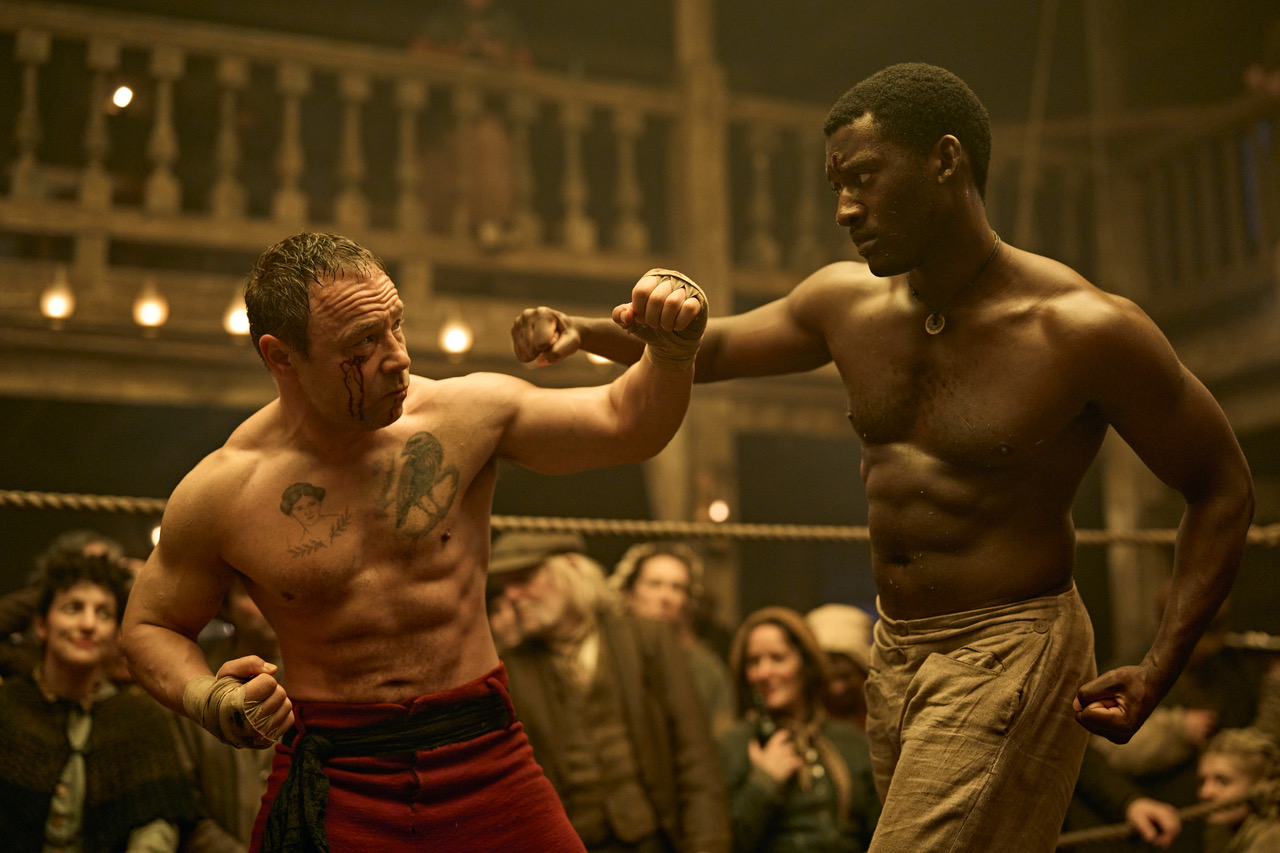Actress Sepideh Moafi embodies what it means to “let the work do the work on you” in her craft. This is more apparent than ever in Apple TV’s latest series Blackbird.
Sepideh Moafi plays Lauren McCauley, an FBI agent who finds herself at the heart of a turbulent murder case against. Playing opposite Taron Egerton and Paul Walter Hauser, Moafi brings a dynamic but deft approach to her character. Sometimes it seems easy to place where the actor ends and the character begins but with Moafi and her characters, the lines are blurred. It is almost as if every choice — from vocal expression to mannerisms — are instinctual, allowing the character, regardless of whether they are rooted in truth or fiction, easily come through. It is a role that is equal parts haunting and heartbreaking as viewers watch Lauren balance what it means to be a woman in the FBI. As Lauren, Moafi serves as the audiences’ perspective; giving us a women’s view into the sometimes overtly toxic masculine world of the FBI and law enforcement.
1883 Magazine’s Editor Kelsey Barnes chats with Sepideh Moafi about the role in Blackbird, healing your inner child through writing and art, and more.
Next year marks one decade since your first on-screen acting credit in Blue Bloods. When you think back over the last 10 years, how would you describe your growth and development as an actress?
Oh, wow. What a great question. I would describe it as pretty transformative. I started as an opera singer. I found music and fell in love, and that put everything into perspective for me. It cleared all of the difficulties and struggles that I was dealing with in my life up until that point. I trained and then started working professionally. Then, I found theatre and felt compelled in the same way. I immersed myself into the world, went to grad school, and moved to New York. I knew I wanted to be in New York because it wasn’t necessarily about film and television, but about art. It was about whatever opportunity called to me because that’s kind of how I was led up until that point. It wasn’t really like I planned what I wanted to do, I just felt like I needed to do it.
Shortly after moving to New York, a month and a half after I graduated, I booked my first TV gig. To be honest, I was ready for the change from the theatre. I was open to anything but I was pretty burnt out from theatre because I had done heavy roles and big shows. I was ready for a new challenge and something different. A lot of friends and colleagues were concerned about me going into TV, but there’s something incredibly liberating about being able to sort of distill and hone that same physical, outward theatrical energy, and control it to be more focused on an audience in the camera.
One of the challenges about going through this career path is there’s so much rejection. I think the biggest lesson from devoting myself fully to this is that you just never know what could happen. You’re always planting seeds and you never know how they’re going to sprout. You never know what opportunities are going to come, what projects or collaborations will come to fruition. Rejection and disappointment drive me forward. I deeply fundamentally believe that things that are going to happen are going to happen no matter what and the things that aren’t going to happen just are not going to happen. I’ve had to learn this throughout the years and I think it has made me a better artist because of it.
It’s a beautiful outlook to have. I was having a similar conversation with someone earlier. You need to learn to make peace with what the universe places, or doesn’t place, in your path. Not getting something you think you want creates the space for something that might even be better.
Yeah, you’re right. What I’m looking for in my work is to surrender that abandonment. I want the work to work on me. The research for a role like Lauren on Blackbird helped me convince myself that I am this person, that I pull off being a special agent which takes years to get in the flow and processes. I needed to do a substantial amount of work to collect the information that could empower me to show up as Lauren. At the end of the day, you show up and you have to let go of all that and let the work do the work on you. I can tell when I’m watching someone and you can see them trying to control or manipulate something. When you allow yourself to be prepared and fully loaded as the artist, you surrender to that. That is the kind of work that I’m interested in watching.
Something I love about your work is that it’s clear every project you pick is different than the last, from The L Word to The Deuce and now with Black Bird. Is that something you always aim to do from project to project?
I don’t do it consciously but things in my life have caused a lot of feelings of misunderstanding and feeling misunderstood. For example, when I was an undergrad, I was studying at the San Francisco Conservatory of Music. A lot of people in my class had been studying instruments or voice or composition since they were four or five years old. I started when I was almost 16 years old. I had no musicianship skills. I was in the pre-musicianship class and within six months, I was in the advanced musicianship class because I was addicted to it. My teachers would pull me aside and tell me to give myself a break [laughs]. It’s funny because, by my fourth year, I was still living it up and partying but showing up and doing the work. A lot of the people I met when I was partying had no idea I was an opera singer because I wouldn’t tell them what I did. I just kind of laugh to myself because people think they know you, they think they see who you are, but they only see one part of who you are depending on what your circumstances are and how they interact with you.
I’m always super cognizant of what is in the script and the story because I come from a background and training of your script acting as your blueprint. The clues are all in there. Then allow your intuition and research to uncover them. That is what attracts me to the roles and projects I select. There is something inherently seductive and interesting to me about different types of roles. Everyone I’ve played, like Lauren and Dr. Farrah on Black Box who is quite buttoned up and a narrow-minded psychiatrist, are people I can connect with. I’m always interested in the full scope of who they are rather than seeing things in black and white. Who is this person, and what lies underneath everything? What are they like after six shots of tequila? Who is she in these different environments?
It’s like creating an unofficial backstory for a character. No one can 100% know every single thing that has ever happened to us.
Yeah, it’s interesting. I’m sure this is the same for you, but I’m not even certain of things in my own backstory but it totally influences the way that I am in my day to day life. Whenever you allow yourself to completely go into the world, these things show up without you trying to control them. When my agent was watching Blackbird, they mentioned that Lauren has these certain things that she does and I didn’t even notice it. That’s what happens when you get out of the work’s way and let it work on you.
Although the show is based on a true story and the book In with the Devil, you took your preparation for the role one step further and you spoke with people in similar jobs that your character Lauren has. I read your living room doubled as an FBI room at one point! What was that experience like for you?
You know, it makes me cry a lot when I think about this, but just how tough Lauren has to be in the world because of her circumstances. She seems fine and totally in control but learning a lot about how women in these male-dominated spaces and the inherent misogyny and sexism that exists is hard to think about. It’s a male-dominated world and you’re forced to present more masculine energy. I felt amazing playing her because she’s so competent. She’s so strong, she’s so real. She doesn’t show it except for some moments, but she’s incredibly vulnerable and compassionate. She knows what she wants and she’s going after it fearlessly. Her not being able to be an excited young agent is what broke my heart. It makes me want to lean into more vulnerable, passionate energy.
Something that differed from the biography was the exploration of toxic masculinity and the male gaze with Keene dancing between flirting with your character while desperately trying to appease Hall. Lauren’s perspective is the only female one the audience is privy to. What was it like exploring those themes on-screen?
We didn’t talk about it too much because it was such a strong script. We allowed that to be our mask and to guide us and the conversations as necessary from there. It was clear that it was such a toxic male world for Lauren. What was interesting was anytime I was on site, it was me and Natalie Kingston, our brilliant director of photography. We were the main female leads. She was our DP and I was our actor, and I appreciated the fact that the men that I was around were incredibly gentle and generous. They were aware too because of the script of how heavily imbalanced the story and perspective of the truth was back then. It’s not like we can sanitize it and have a bunch of female characters — Lauren is based on a collection of different FBI agents and characters who were involved in the case and we’re involved in this time. It felt safe for me as the actor even if my character had to have her defences up and be ready for anything.
Lauren represented womanhood in the show. She captured and encapsulated what was lacking. There are subtle things that happen throughout where it plays on that. When Miller and McCauley in episode two are having a meeting with the polygrapher, Beaumont says he doesn’t want Lauren in the room. She purses her lips and bites her tongue because how many times have you been in this situation? These little things are just as important to show.
Early last year you hosted a workshop for Girls Write Now where you shared your own experience growing up as a refugee and you encouraged viewers to write from prompts like home and belonging. It was such a beautiful hour of creativity and expression. You recited your own first-person essay and it was so powerful. What was it like writing that piece a few years ago and revisiting it between then and now?
I think what that symbolized for me was a bigger moment of courage. There was so much shame in my childhood of our background and socioeconomic status. I never felt like I could fully show myself. Even though I do live a pretty private life, it’s obviously a public career path, but there was still always shame about my past. I wrote that piece to support this fundraiser that I was doing for IRC in the New York City Mayor’s Office of Immigrant Affairs to get more bums in seats to raise more money. I wanted to show myself as an example of someone who came from that background and is trying her best to contribute as an artist and as a humanitarian to give back.
Writing that piece was such a big decision and a conversation with my parents because I knew that if I wrote that piece and it was public knowledge, then they couldn’t go back to Iran ever again. It was a significant turning point in my activism and my humanitarian work. I felt like I could use all of myself to bring more relevance and interest to this subject matter. I really enjoyed writing that piece. It skims the surface and gives us a brief summary of the little things that nobody knows when you’re younger and what’s happening at home. We all have this experience — whether you have a healthy lovely home life or, in my case, a very loving, healthy family dynamic but a lot of PTSD. I was incessantly bullied and ostracized in school growing up, so being able to share more of that felt like a big relief than anything else. I know that if I had access to something like that as a child, it would give me the courage that I felt I needed at that moment. At the same time, I do think that we find our courage as we need it. You know when the time is right. If I can help expedite that process for anyone — any young girl, boy, non-binary, trans, or anyone’s child — then I feel like I am doing my job.
In the workshop you talked about people as a “library of life.” I’d love to know some books that have shaped, resonated, or inspired you in some way.
Great question. I read one a few months ago and it has stuck with me. It’s by Richard Powers and it’s called Bewilderment. It’s essentially the story of an astrophysicist. He’s a widowed man and his son is going through a really hard time. He has Asperger’s and obsessive-compulsive disorder. He’s just lost his dog and his mother and it’s the story about the vastness of our existence in our universe, but it’s at its core it’s about this relationship between his father and his son. Any time I read anything I always think about how my younger self would respond to it. Whenever I read about kids who are misfits or didn’t belong, or who never felt like they had a sense of home and were made to feel bad about not being “normal,” my heart always aches. These are things that really resonate with me and have always really resonated with me.
With reading, it always depends on what part of your life you’re in and what things you went through. Writing, language, music, and art can open up your sense of reality. It expands the way you look at objects and people. It encourages you to believe in yourself and your feelings. It’s really transformative right? That’s why we go see great art and read great literature. One of the earliest books that I can remember having that kind of connection with was Charlotte’s Web.
That was such a formative book for me in my childhood as well.
Yeah, I remember reading it and feeling like I was in it. Having that perspective of an animal and sharing the feeling that we are these beings that are all connected.
Lastly, if you could manifest something for yourself this year what would it be?
I have very specific things that maybe I shouldn’t put out in the universe just yet, but overall I’d love to manifest overflowing abundance, freedom, and all that comes with it.
Blackbird is streaming now on Apple TV.
Interview Kelsey Barnes
Photography Luke Fontana
Styling Kevin Michael Ericson
Hair Rena Calhoun
Makeup Kirin Bhatty





